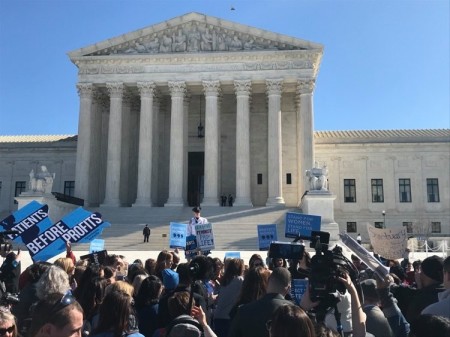Supreme Court strikes down Louisiana law regulating abortion clinics

The U.S. Supreme Court rejected a Louisiana state law requiring abortion providers to be held to similar standards as ambulatory surgical centers.
In a decision released Monday, the high court ruled in the case of June Medical Services v. Russo that abortion providers do not need to be held to stricter standards.
Justice Stephen Breyer announced the judgment of the court and was joined in his opinion by Justices Ruth Bader Ginsburg, Sonia Sotomayor, and Elena Kagan. Chief Justice John Roberts filed a concurring opinion.
In his opinion, Breyer noted that the Louisiana law was largely identical to a Texas state law that had been declared unconstitutional in an earlier Supreme Court decision, known as Whole Woman’s Health v. Hellerstedt.
“In this case, we consider the constitutionality of a Louisiana statute, Act 620, that is almost word-for-word identical to Texas’ admitting-privileges law,” wrote Breyer.
“Those findings mirror those made in Whole Woman’s Health in every relevant respect and require the same result. We consequently hold that the Louisiana statute is unconstitutional.”
Justices Clarence Thomas authored one of the dissents to the court decision, saying that the majority was “enjoining a perfectly legitimate state law and doing so without jurisdiction.”
“The Constitution does not constrain the States’ ability to regulate or even prohibit abortion. This Court created the right to abortion based on an amorphous, unwritten right to privacy, which it grounded in the ‘legal fiction’ of substantive due process,” wrote Thomas.
“As the origins of this jurisprudence readily demonstrate, the putative right to abortion is a creation that should be undone.”
In 2014, Louisiana passed the Unsafe Abortion Protection Act, requiring abortion providers to have admitting privileges at a hospital within 30 miles of where they perform the procedure.
The law was blocked from taking effect and a similar law passed in Texas was struck down by the Supreme Court in a 5-3 decision in 2016 known as Whole Woman’s Health v. Hellerstedt.
Last October, the Supreme Court agreed to hear an appeal in the case and in March, oral arguments in the case were heard, with both sides holding demonstrations outside the court.
Many considered the case noteworthy since it was the first abortion-related case brought before the Supreme Court since the confirmations of Justices Neil Gorsuch and Brett Kavanaugh.
“Everyone is very interested to see how they rule,” said Kristan Hawkins, president of Students for Life of America, to The Christian Post back in March.
“We are very close to achieving our phase one goal of reversing Roe, sending the decision back to the states where we will then fight state by state to make abortion illegal as well as unthinkable.”





















